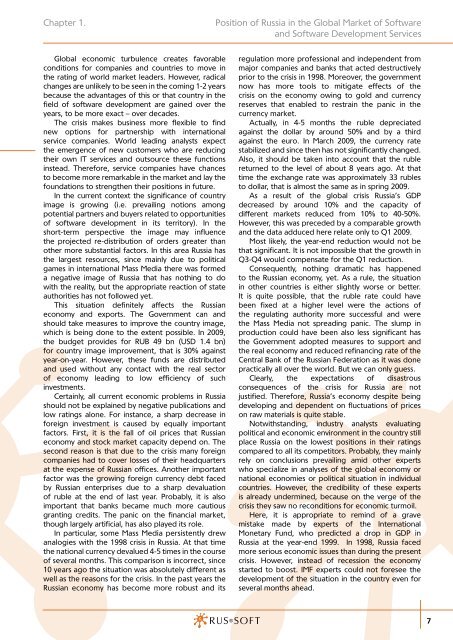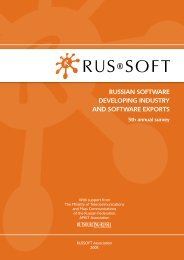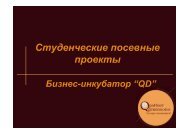russian software developing industry and software exports
russian software developing industry and software exports
russian software developing industry and software exports
You also want an ePaper? Increase the reach of your titles
YUMPU automatically turns print PDFs into web optimized ePapers that Google loves.
Chapter 1.<br />
Position of Russia in the Global Market of Software<br />
<strong>and</strong> Software Development Services<br />
Global economic turbulence creates favorable<br />
conditions for companies <strong>and</strong> countries to move in<br />
the rating of world market leaders. However, radical<br />
changes are unlikely to be seen in the coming 1-2 years<br />
because the advantages of this or that country in the<br />
field of <strong>software</strong> development are gained over the<br />
years, to be more exact – over decades.<br />
The crisis makes business more flexible to find<br />
new options for partnership with international<br />
service companies. World leading analysts expect<br />
the emergence of new customers who are reducing<br />
their own IT services <strong>and</strong> outsource these functions<br />
instead. Therefore, service companies have chances<br />
to become more remarkable in the market <strong>and</strong> lay the<br />
foundations to strengthen their positions in future.<br />
In the current context the significance of country<br />
image is growing (i.e. prevailing notions among<br />
potential partners <strong>and</strong> buyers related to opportunities<br />
of <strong>software</strong> development in its territory). In the<br />
short-term perspective the image may influence<br />
the projected re-distribution of orders greater than<br />
other more substantial factors. In this area Russia has<br />
the largest resources, since mainly due to political<br />
games in international Mass Media there was formed<br />
a negative image of Russia that has nothing to do<br />
with the reality, but the appropriate reaction of state<br />
authorities has not followed yet.<br />
This situation definitely affects the Russian<br />
economy <strong>and</strong> <strong>exports</strong>. The Government can <strong>and</strong><br />
should take measures to improve the country image,<br />
which is being done to the extent possible. In 2009,<br />
the budget provides for RUB 49 bn (USD 1.4 bn)<br />
for country image improvement, that is 30% against<br />
year-on-year. However, these funds are distributed<br />
<strong>and</strong> used without any contact with the real sector<br />
of economy leading to low efficiency of such<br />
investments.<br />
Certainly, all current economic problems in Russia<br />
should not be explained by negative publications <strong>and</strong><br />
low ratings alone. For instance, a sharp decrease in<br />
foreign investment is caused by equally important<br />
factors. First, it is the fall of oil prices that Russian<br />
economy <strong>and</strong> stock market capacity depend on. The<br />
second reason is that due to the crisis many foreign<br />
companies had to cover losses of their headquarters<br />
at the expense of Russian offices. Another important<br />
factor was the growing foreign currency debt faced<br />
by Russian enterprises due to a sharp devaluation<br />
of ruble at the end of last year. Probably, it is also<br />
important that banks became much more cautious<br />
granting credits. The panic on the financial market,<br />
though largely artificial, has also played its role.<br />
In particular, some Mass Media persistently drew<br />
analogies with the 1998 crisis in Russia. At that time<br />
the national currency devalued 4-5 times in the course<br />
of several months. This comparison is incorrect, since<br />
10 years ago the situation was absolutely different as<br />
well as the reasons for the crisis. In the past years the<br />
Russian economy has become more robust <strong>and</strong> its<br />
regulation more professional <strong>and</strong> independent from<br />
major companies <strong>and</strong> banks that acted destructively<br />
prior to the crisis in 1998. Moreover, the government<br />
now has more tools to mitigate effects of the<br />
crisis on the economy owing to gold <strong>and</strong> currency<br />
reserves that enabled to restrain the paniс in the<br />
currency market.<br />
Actually, in 4-5 months the ruble depreciated<br />
against the dollar by around 50% <strong>and</strong> by a third<br />
against the euro. In March 2009, the currency rate<br />
stabilized <strong>and</strong> since then has not significantly changed.<br />
Also, it should be taken into account that the ruble<br />
returned to the level of about 8 years ago. At that<br />
time the exchange rate was approximately 33 rubles<br />
to dollar, that is almost the same as in spring 2009.<br />
As a result of the global crisis Russia’s GDP<br />
decreased by around 10% <strong>and</strong> the capacity of<br />
different markets reduced from 10% to 40-50%.<br />
However, this was preceded by a comparable growth<br />
<strong>and</strong> the data adduced here relate only to Q1 2009.<br />
Most likely, the year-end reduction would not be<br />
that significant. It is not impossible that the growth in<br />
Q3-Q4 would compensate for the Q1 reduction.<br />
Consequently, nothing dramatic has happened<br />
to the Russian economy, yet. As a rule, the situation<br />
in other countries is either slightly worse or better.<br />
It is quite possible, that the ruble rate could have<br />
been fixed at a higher level were the actions of<br />
the regulating authority more successful <strong>and</strong> were<br />
the Mass Media not spreading panic. The slump in<br />
production could have been also less significant has<br />
the Government adopted measures to support <strong>and</strong><br />
the real economy <strong>and</strong> reduced refinancing rate of the<br />
Central Bank of the Russian Federation as it was done<br />
practically all over the world. But we can only guess.<br />
Clearly, the expectations of disastrous<br />
consequences of the crisis for Russia are not<br />
justified. Therefore, Russia’s economy despite being<br />
<strong>developing</strong> <strong>and</strong> dependent on fluctuations of prices<br />
on raw materials is quite stable.<br />
Notwithst<strong>and</strong>ing, <strong>industry</strong> analysts evaluating<br />
political <strong>and</strong> economic environment in the country still<br />
place Russia on the lowest positions in their ratings<br />
compared to all its competitors. Probably, they mainly<br />
rely on conclusions prevailing amid other experts<br />
who specialize in analyses of the global economy or<br />
national economies or political situation in individual<br />
countries. However, the credibility of these experts<br />
is already undermined, because on the verge of the<br />
crisis they saw no reconditions for economic turmoil.<br />
Here, it is appropriate to remind of a grave<br />
mistake made by experts of the International<br />
Monetary Fund, who predicted a drop in GDP in<br />
Russia at the year-end 1999. In 1998, Russia faced<br />
more serious economic issues than during the present<br />
crisis. However, instead of recession the economy<br />
started to boost. IMF experts could not foresee the<br />
development of the situation in the country even for<br />
several months ahead.<br />
7








